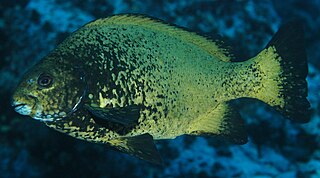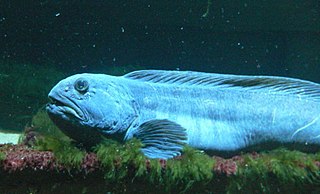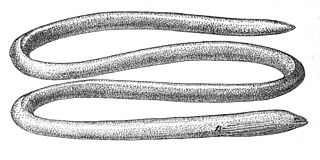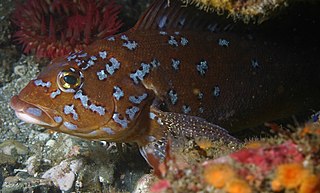
Blenny is a common name for many types of fish, including several families of percomorph marine, brackish, and some freshwater fish sharing similar morphology and behaviour. Six families are considered "true blennies", grouped under the order Blenniiformes; its members are referred to as blenniiformids. About 151 genera and nearly 900 species have been described within the order. The order was formerly classified as a suborder of the Perciformes but the 5th Edition of Fishes of the World divided the Perciformes into a number of new orders and the Blenniiformes were placed in the percomorph clade Ovalentaria alongside the such taxa as Cichliformes, Mugiliformes and Gobiesociformes.

The superorder Elopomorpha contains a variety of types of fishes that range from typical silvery-colored species, such as the tarpons and ladyfishes of the Elopiformes and the bonefishes of the Albuliformes, to the long and slender, smooth-bodied eels of the Anguilliformes. The one characteristic uniting this group of fishes is they all have leptocephalus larvae, which are unique to the Elopomorpha. No other fishes have this type of larvae.

Sawtooth eels are a family, Serrivomeridae, of eels found in temperate and tropical seas worldwide.

The sea chubs, also known as rudderfish and pilot fish and in Hawaiian as enenue or nenue, are a family, Kyphosidae, of fishes in the order Perciformes native to the Atlantic, Indian and Pacific Oceans usually close to shore in marine waters.

Anarhichadidae, the wolffishes, sea wolves or wolf eels, is a family of marine ray finned fishes belonging to the order Perciformes. These are predatory, eel shaped fishes which are native to the cold waters of the Arctic, North Pacific and North Atlantic Oceans.

Stichaeidae, the pricklebacks or shannies, are a family of marine ray-finned fishes in the suborder Zoarcoidei of the order Scorpaeniformes. Most species are found in the North Pacific Ocean with a few in the North Atlantic Ocean.
Cyema is a monospecific genus of marine ray-finned fish belonging to the monotypic family Cyematidae. The only species in the genus is Cyema atrum, the arrow eel, bobtail eel, bobtail snipe eel or deepwater eel. This species has circumglobal distribution.

Monognathus, or onejaw, is the only genus of the family Monognathidae of deep-sea eels. The name comes from the Greek monos meaning “one” and gnathos meaning “jaw”, a reference to the large mouth in comparison with the rest of the fish, and also the absence of an upper jaw.

The Moringuidae are a small family of eels commonly known as spaghetti eels or worm eels, although the latter name is also shared with other families of eels.

Gymnocephalus is a genus of ray-finned fishes from the family Percidae, which includes the perches, pike-perches and darters. They are from the Western Palearctic area, although one species, Gymnocephalus cernua has been accidentally introduced to the Great Lakes region where it is regarded as an invasive species. They have the common name "ruffe" and resemble the true perches in the genus Perca, but are usually smaller and have a different pattern.

Zaniolepis, the combfishes, is a genus of marine ray-finned fish, it is one of two genera in the family Zaniolepididae. These fishes are native to the eastern Pacific Ocean. Z. frenata that was a source of food to the Native American inhabitants of San Nicolas Island off the coast of southern California, United States during the Middle Holocene.

The Chlopsidae, or false morays, are a family of marine ray-finned fishes belonging to the order Anguilliformes, the eels. The eels in this family arefound in coral reefs worldwide. As their name suggests, they somewhat resemble moray eels in appearance. However, they are smaller than true morays, ranging from 11 to 42 cm in length.
Polyacanthonotus is a genus of spiny eels, with these currently recognized species:
Nessorhamphus is a genus of eels in the family Derichthyidae. It currently contains the following species:

Hexagrammos is a genus of marine ray-finned fishes belonging to the family Hexagrammidae, the greenlings. These fishes are found in the north Pacific Ocean.

Pleurogrammus is a genus of ray-finned fishes belonging to the family Hexagrammidae, the greenlings, known as Atka mackerels. These fishes are found in the northwestern Pacific Ocean.

Myrophinae, the worm eels, is a subfamily of ray-finned fishes belonging to the family Ophichthidae, which also includes the snake eels in the subfamily Ophichthinae.

Congroidei is a suborder of ray-finned fishes belonging to the order Anguilliformes, the eels. These eels are mostly marine, although a few species of snake eel will enter freshwater, and they are found in tropical and tempareate waters throughout the world.
Gymnelinae is a subfamily of marine ray-finned fish belonging to the family Zoarcidae, the eelpouts. Most species are found in the North Pacific Ocean but one genus is cosmopolitan, and another is endemic to the Southern Ocean.

Ilyophinae, the arrowtooth ells or mustard eels, is a subfamily of marine ray-finned fishes belongiing to the family Synaphobranchidae, the cutthroat eels. Within its family this subfamily shows greatest number of species and the greatest morphological diversity.
















